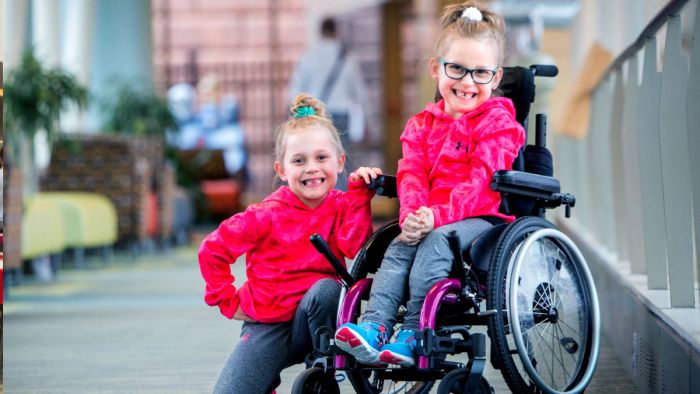When you come to Gillette Children’s for your child’s surgery, you’ll spend a lot of time worrying about the child who will soon undergo a surgical procedure. It’s a stressful time for you and your child, but also for any siblings in the family.
The child life specialists at Gillette are experts who have extensive knowledge of child development and can help all the children in your family during this time. Child life specialists are trained to understand how children cope with the stress of being in the hospital environment, and how it can affect their development.
“Members of our team use a variety of techniques to prepare, comfort and distract kids—whether it’s the child having the procedure, or an anxious sibling,” says Megan Engelke, CCLS, child life specialist, “Giving kids activities to keep them busy and sharing education so they know what to expect is usually a big help for the siblings.”
Having a sibling who is hospitalized and seeing stressed parents can bring a lot of emotions to the surface for children. Here are some common feelings that brothers and sisters may have when learning that their sibling will have surgery or be hospitalized:
- Confusion: Siblings may not understand what is happening, especially if the surgery or hospitalization is sudden.
- Guilt: Siblings may feel guilty that they aren’t the ones who are sick or they might think they caused the hospitalization for some reason.
- Fear: Siblings may be afraid they might “catch” what their brother or sister has and require a hospitalization also. They may be afraid their brother or sister won’t get well again or that they may not come home.
- Jealousy: Siblings may feel jealous at all of the extra attention the hospitalized child is getting, including gifts and special visitors.
- Worry: Siblings may wonder who will take care of them when their parents are at the hospital so much or be worried about staying with less familiar adults.
Every child is different and can express themselves in a different way. Keep an eye out for any changes in your child’s behavior. Siblings may express what they’re feeling by:
- Changing eating habits – either eating more or less than usual
- Changing sleeping habits – either sleeping more or less than usual
- Becoming withdrawn from family and friends
- Playing more aggressively
- Acting in a way that gets more attention
- Regressing to habits from an earlier age (bed-wetting, thumb-sucking, etc)
It helps to provide each of your children extra love, hugs and support. Other things that can help siblings cope include:
- Give honest, age-appropriate answers to questions about the surgery or hospitalization. Give younger children simple answers and older children more information. Children who get incomplete information may make up their own ideas that are worse than the real situation.
- Let siblings help prepare for the hospital experience, such as packing hospital bags, sending a picture or favorite stuffed animal, or reading stories about going to the hospital or having surgery.
- If an emergency hospitalization or surgery occurs, explain the situation to the sibling as soon as possible.
- Schedule a hospital tour for siblings and the patient, if possible, and have the sibling visit the hospitalized child.
- Try to stick to the normal routine as much as possible, including sending the child to school or daycare. If you can’t be there with the sibling, have the caregiver stick to your schedule.
- Make special time for you and your child. Getting special attention will help them feel important too.
It’s not always possible to have siblings along for each hospital visit, but it’s easy to help siblings at home feel connected, even when they aren’t at the hospital. Try activities like:
- FaceTime or talk to each other on the phone.
- Send photos and videos back and forth.
- Write a card or draw a picture to decorate the hospital room.
- Video or audio record bedtime stories, or read to them over the phone.
 Home Page
Home Page

